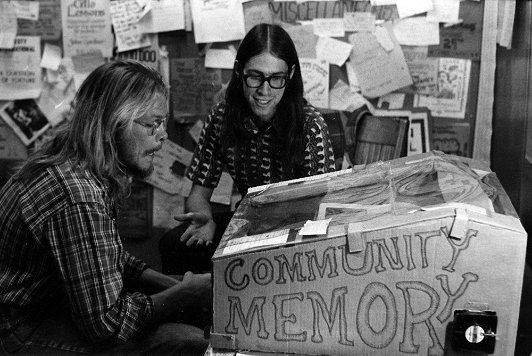Novelist William Gibson has always seemed to exist in two moments at once, ours and the one about to occur. He comes by the duality naturally, having been raised with a foot in two temporal realities. A couple of quick passages follow from a new Gibson Q&A conducted by David Kushner of Rolling Stone.
____________________________
Question:
You also lost your father when you were a kid. How did that affect your development as a writer?
William Gibson:
Well, in the first place, I think there’s simply the mechanism of trauma in early life, which as an adult having watched other people go through that now, I can understand as being profoundly destabilizing. But the other thing it did was it caused my mother to return to the small town in Virginia from which both she and my father were originally from. So my earliest childhood memories were of living in a 1950s universe of Fifties stuff, as the construction company my father worked for built infrastructure projects across the South. . .lots of Levittown-style subdivisions. After my father’s death we returned to this little place in the mountains where you look out the window and in one direction, you might see tailfins and you’d know you were in the early Sixties. In the other, you’d see a guy with a straw hat using a mule to plow a field — and it could have been like 1890 or 1915. It felt to me like being exiled in the past; I was taken away from this sort of modern world, and partially emerged in this strange old place that, perhaps because of the traumatic circumstances of my arrival, I never entirely came to feel a part of. I observed the people around me as though I was something else. I didn’t feel that I was what they were. I can see that as the beginning of the novelistic mind.
____________________________
Question:
At the time you coined “cyberspace,” you’d supposedly barely spent any time on a computer. That’s hard to believe.
William Gibson:
Oh no, I had scarcely seen one. Personal computers were not common objects at all, and I had been writing short fiction on the kind of manual portable that hipsters are starting to pay really good money for now. And then a friend of mine called from Texas and said, “My dad just gave me this machine called an Apple IIc, and, like, it automates the writing of fiction — you’ve gotta get one.” So I went down to a department store, which was the only Apple dealership in town. I bought the IIc and the printer and the bits you needed to make it work and took it all home in a box, and never looked back. It was a godsend for me because I can’t type, and having this endlessly correctable, effortlessly correctable way to write was fantastic.
Question:
In fact, you came up with the idea of cyberspace after seeing some kids playing video games in an arcade. What was it about them that inspired you?
William Gibson:
It was their body language, this physical manifestation of some kind of intense yearning. And it seemed to me that had they been able to, they would have reached through the screen — like, reached through the glass — and directly manipulated the pixels to get the result they wanted. It was the combination of that seeing these gamers and those ads for early laptops. I made the imaginative leap that behind the screen of each personal computer, there was a notional space. And what if the notional space behind the screen of each computer was a shared notional space? And that was all it took to have the cyberspace idea. I had some vague, vague sense of what the Internet then consisted of, because I knew a few people in Seattle who worked for very, very early iterations of the Seattle digital tech scene. They talked about DARPA, they talked about the Internet. The idea that there was an Internet was less a part of what I was doing than my sense that there could be a shared notional space and that it would be extra-geographical. The space behind the screen was the same space behind the screen in Vancouver or Nairobi.•
Tags: David Kushner, William Gibson

